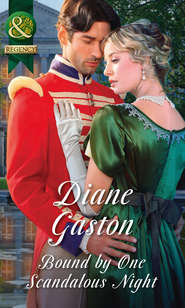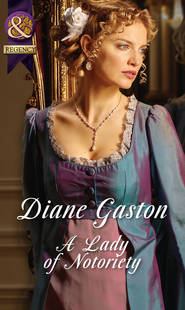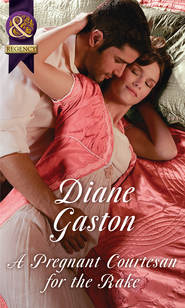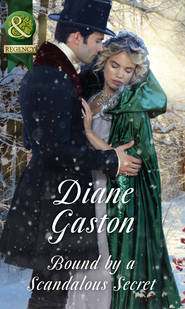По всем вопросам обращайтесь на: info@litportal.ru
(©) 2003-2024.
✖
Bound By Their Secret Passion
Настройки чтения
Размер шрифта
Высота строк
Поля
With luck it would all be settled before then.
After Dell and Lorene left the morning room, he said, ‘I would offer my arm, but I fear the politeness would be misconstrued if seen by one of the servants.’
She nodded.
It was his first opportunity to see her alone. ‘How do you fare, Lorene?’
‘I am well.’ She averted her gaze. ‘I do not know if I am well. I suppose I am numb. I really feel very little of anything.’
That was better than suffering, he knew.
‘I am dreading this interview, though,’ she murmured.
Of course she was. Telling of it would bring it all back.
‘Speak with complete candour,’ he said. ‘That is the only way.’
Dixon attended the door. He gave them a smug look that set Dell’s teeth on edge, but acted the proper butler, opening the door and stepping ahead to announce them.
The room Dixon had chosen was not the opulent drawing room with murals of gods and goddesses where he and Ross had once been received in this house. This was another lesser drawing room tucked away in one of the corridors on the first floor. Once they entered the room, Dell knew exactly why the butler had chosen this place. Every available space on the wainscoting walls was filled with family portraits, reminding those entering that generations of Tinmores would be watching.
Lorene’s step faltered.
Two men were present in the room. One, a pleasant-looking, somewhat corpulent man in his fifties, sat behind a desk, paper, pen and ink in front of him. The other man, taller, thinner with dark assessing eyes, stood at his side.
‘Lady Tinmore and Lord Penford,’ Dixon announced in a voice tinged with disdain.
The gentleman behind the desk stood and walked around to greet them. ‘Come in. Come in.’ He spoke as if inviting them for tea.
Lorene walked up to him. ‘Squire Hedges. Do you remember me? I was Miss Lorene Summerfield, now Lady Tinmore. You were frequently a guest in my father’s house.’
‘Ah, yes, indeed I remember you,’ he replied with an engaging smile. ‘But you were in a pinafore last I saw you. Your father and I were indeed fast friends...for many years until he...but never mind that. I was sorry to lose him.’ The Squire seemed to collect himself and his expression sobered. ‘May I express my condolences? For the loss of your husband, I mean. Not your father.’
‘I do understand, sir.’ She made a nervous glance to the other man.
Dell had heard of Squire Hedges, a local landowner. Was he the magistrate? He would have known Tinmore, perhaps for decades. Who, then, was the other man?
Lorene turned to Dell. ‘Lord Penford, may I present Squire Hedges. The magistrate here.’ She again addressed herself to the Squire. ‘Lord Penford inherited Summerfield House.’
Dell bowed. ‘Squire.’
The man bowed in return. ‘I intended to call upon you, sir. Forgive the omission. Busy, you know. Time gets away from a person.’
‘Yes, it does.’ Dell pointedly looked at the other man.
‘Oh.’ The Squire stepped over to the stranger. ‘Allow me to present Mr Walsh. He is the coroner.’
‘The coroner?’ Lorene’s brows rose, but she collected herself. ‘Oh, yes. Lord Penford said there would be a coroner.’
‘Must call in the coroner, my lady,’ Squire Hedges explained. ‘Not a natural death and all that.’
The coroner bowed. ‘My lady. Lord Penford.’
‘Sir,’ Lorene responded.
The Squire smiled at her, sobered again, cleared his throat and clapped his hands together. ‘Well! I suppose we should proceed, should we not?’ He walked back to the chair behind the desk.
‘Lady Tinmore.’ Mr Walsh spoke up in a deep voice with little modulation. ‘Perhaps you would be good enough to leave the room while we speak to Lord Penford?’
Squire Hedges smiled again. ‘We will call you forthwith.’
A worry line formed between her eyes before she curtsied and left the room.
The Squire gestured with his finger. ‘Please sit, sir.’
Dell took a step closer to the desk. ‘I would prefer to stand. I have no objection to you sitting, though.’ His years in the army taught him it was better to stand when facing a man who might have power over him.
The Squire lifted his shoulders and sat, folding his hands in front of him on the desk. Mr Walsh remained standing.
Dell waited for one of them to speak.
The Squire cleared his throat again. ‘Uh...suppose you tell us what happened?’
Dell glanced from one man to the other. ‘First tell me what you have heard already.’
Had Dixon already spoken to them? he meant.
Squire Hedges picked up the pen and rolled it in his fingers.
‘We interviewed Dixon, the butler,’ Mr Walsh answered, which told Dell very little.
Dell straightened and gave each man a steely glance. ‘You spoke to the butler before me?’ To speak to a servant before a member of the aristocracy was a breach of proper conduct.
Squire Hedges tapped the feather pen on the desk. ‘Well, he greeted us in the hall, you see. Expedient to talk to him first.’
By Dixon’s design, Dell was certain. Dell stared at the Squire, until he squirmed in his seat.
Still holding his gaze steady, Dell spoke. ‘What did the butler tell you?’
Hedges looked even more uncomfortable.
‘He believes you pushed Lord Tinmore to his death,’ Walsh said.
Dell turned to Walsh and spoke in a firm, no-nonsense tone. ‘You have placed me at a disadvantage by speaking to Dixon first, but I assure you I did not push Lord Tinmore to his death.’
Walsh shrugged. ‘Then tell what did happen.’
Dell answered, ‘Lord Tinmore attempted to strike me with his cane. I seized it to fend off the attack. He abruptly let go, put his hands to his head and staggered backwards. He lost his footing on the steps. I attempted to catch him, but he fell down the steps to the paving stones below.’











